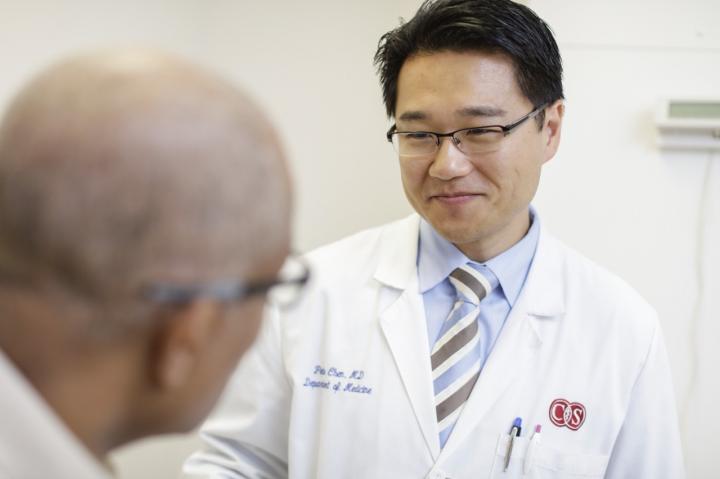Therapy may hold promise for fighting pandemic

Credit: Photo by Cedars-Sinai
COVID-19 (coronavirus) patients who were administered a novel antibody had fewer symptoms and were less likely to require hospitalization or emergency medical care than those who did not receive the antibody, according to a new study published in the The New England Journal of Medicine.
The multisite, Phase II clinical trial tested three different doses of LY-CoV555, a monoclonal antibody derived from the blood of a recovered COVID-19 patient. While the trial is ongoing, results from the interim analysis indicated a reduced viral load in outpatients with mild to moderate cases of COVID-19 at the 2,800-milligram dosage level, along with reduced rates of hospitalization and emergency medical care among patients at all dosage levels.
The study’s co-first author, Peter Chen, MD, professor of Medicine and director of the Division of Pulmonary and Critical Care Medicine at Cedars-Sinai, said the results are promising.
“For me, the most significant finding was the reduction in hospitalizations,” Chen said. “Monoclonal antibodies like this have the potential to reduce the severity of COVID-19 for many patients, allowing more people to recover at home.”
Monoclonal antibodies work by attaching themselves to a virus and preventing it from replicating. LY-CoV555 binds to a particular protein, called a spike protein, which SARS-CoV-2, the virus that causes COVID-19, needs in order to enter human cells and replicate. By preventing the virus from replicating, the antibody slows down the viral process, allowing the patient’s own immune system time to kick into gear.
“What we’re doing is preventing the virus from causing too much damage early on in the process,” Chen said. “We’re buying the patients time, so that their bodies can start developing their own immunity to fight the virus.”
Patients in the randomized, double-blind study were given intravenous doses of either 700, 2,800 or 7,000 milligrams of the antibody, or a placebo. Investigators used a nasopharyngeal swab to test patients’ viral load before administering the antibody and again at several points after administering the drug. Patients in the trial were also given a questionnaire about their subsequent symptoms and treatment.
Approximately 300 patients received the treatment (100 patients per dosage level) and approximately 150 patients received the placebo. Of the three dosage levels, the 2,800-milligram dosage was shown to be effective in reducing viral load. By day 11, viral load was substantially diminished for most patients, including those in the placebo arm. Further studies will be needed to validate these results, according to the investigators.
“The publication of these data in a peer-reviewed journal adds to the growing body of evidence for the potential utility for neutralizing antibodies as therapeutics for people recently diagnosed with mild to moderate COVID-19, particularly high-risk patients,” said Ajay Nirula, MD, PhD, vice president of immunology at Eli Lilly and Company and co-first author of the study. “These data show LY-CoV555 may be effective in treating COVID-19 by reducing viral load, symptoms and the risk of hospitalization in outpatients.”
At day 29, hospitalization rates were only 1.6% in the antibody-treated group, compared with 6.3% in the group that received the placebo.
Importantly, the reduction in hospitalizations was seen across all demographic groups, including those in high-risk categories: adults older than 65 and those with a high body mass index (greater than 35). For high-risk patients, hospitalization rates were 4.2% in patients treated with the antibody, compared with 14.6% in placebo-treated patients. The safety profile of patients treated with LY-CoV555 was similar to that of placebo-treated patients.
“We know that COVID-19 is especially hard on the elderly, the obese and people with certain pre-existing health conditions,” Chen said. “Antibody treatments like this may have the most benefits for people in these higher-risk categories.”
###
The corresponding author of the new study was Daniel M. Skovronsky, MD, PhD, from Eli Lilly and Company. The other co-first author was Ajay Nirula, MD, PhD, also from Eli Lilly and Company. The research involved investigators from a total of 11 institutions and companies.
Funding: This trial was funded by Eli Lilly and Company.
Read more on the Cedars-Sinai Blog: A Positive Outcome: Donating Plasma After COVID-19
Media Contact
Sarah R. Lichtman
[email protected]
Original Source
https:/




